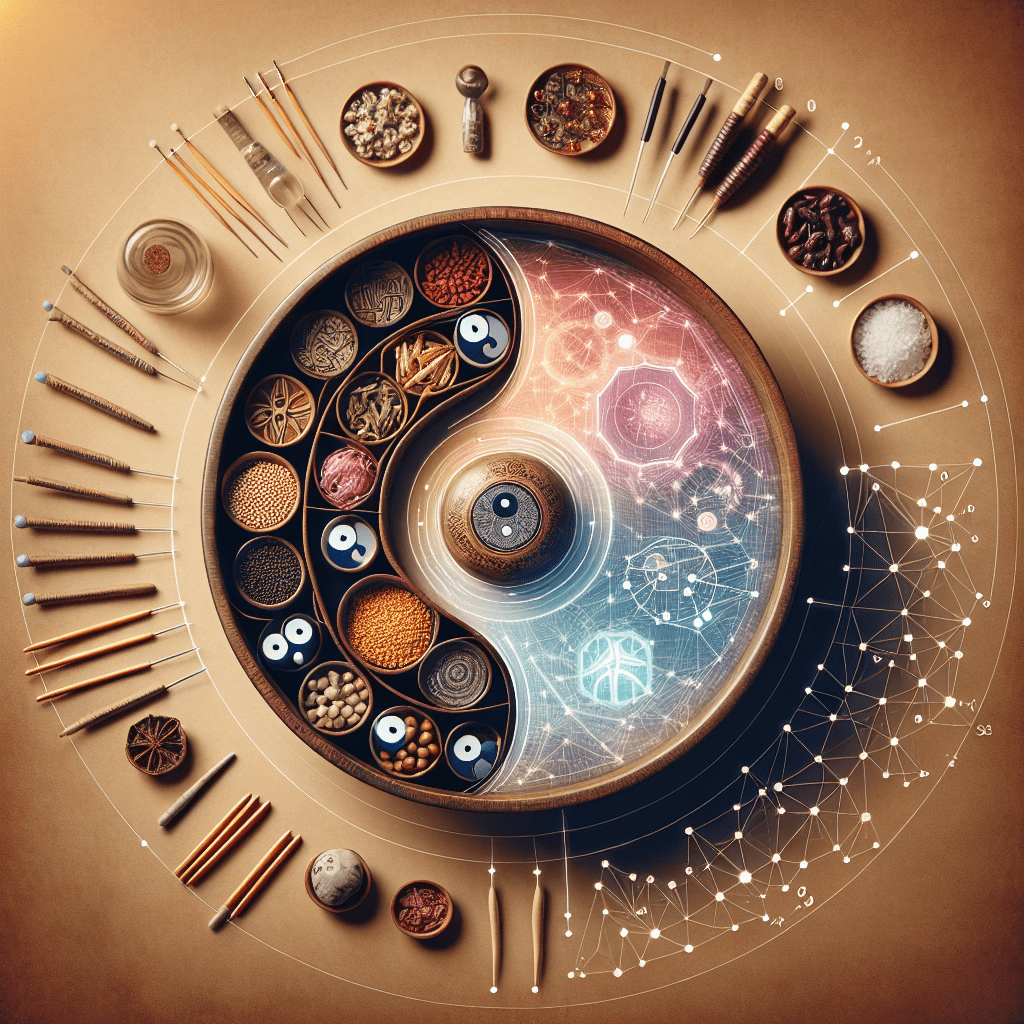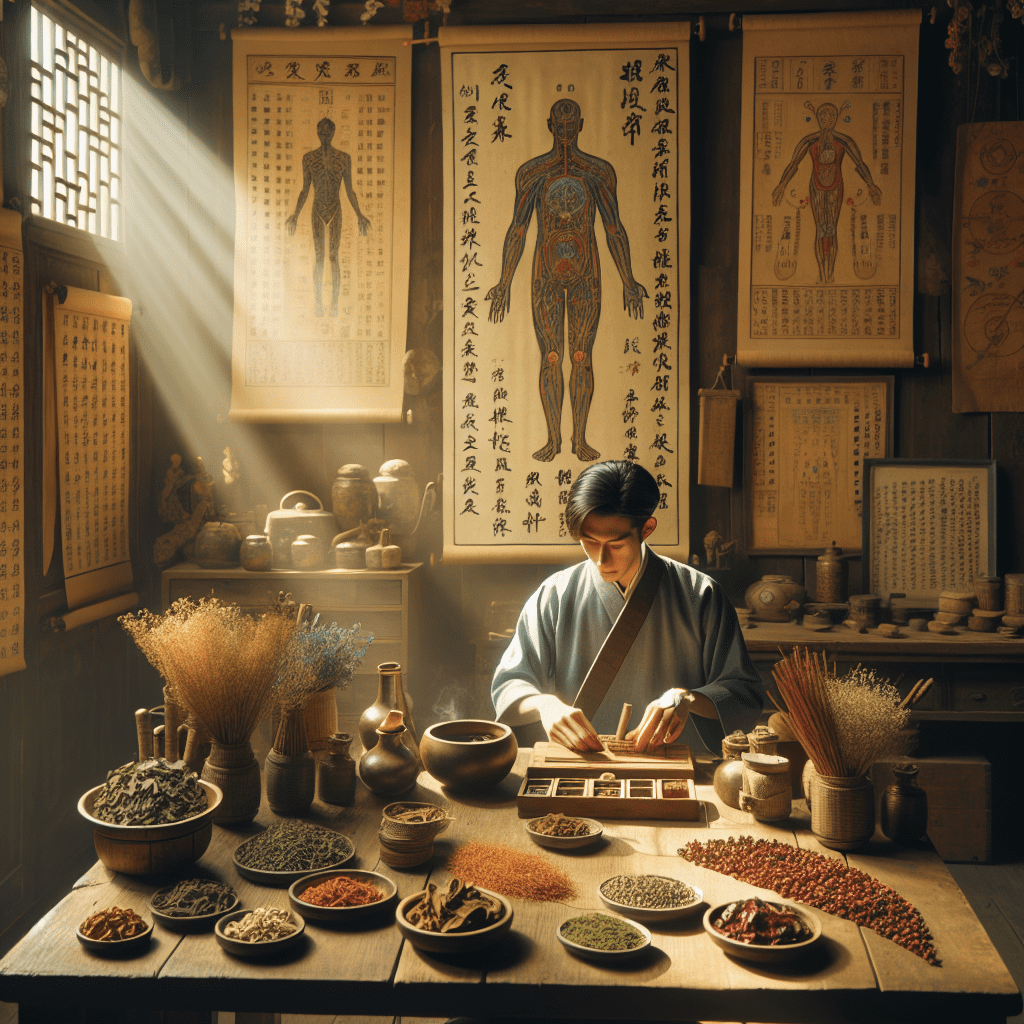In our fast-paced modern world where health trends come and go, there exists a medical tradition that has stood the test of time for over 2,000 years. Traditional Chinese Medicine (TCM) offers a profound wisdom that continues to influence health practices globally. Far from being outdated, TCM principles provide a complementary alternative to contemporary treatments, addressing both physical and mental health needs with a holistic perspective that many find missing in conventional medicine.
As health-conscious individuals increasingly seek natural, integrated approaches to wellness, TCM’s ancient wisdom offers valuable insights that can enhance and complement modern health journeys. This time-tested system doesn’t ask us to abandon conventional medicine but instead provides a framework that can work alongside it, filling gaps in our understanding of health and offering new pathways to healing.
The Wisdom of Balance: Understanding Yin-Yang Theory
At the heart of TCM principles lies the Yin-Yang theory, perhaps one of the most recognizable concepts from Eastern philosophy. This theory suggests that everything in our universe exists as inseparable and contradictory opposites—think of day and night, hot and cold, activity and rest. These opposites aren’t static; they’re in a constant dance of balance and transformation.
In health terms, Yin represents the cooling, moistening, and calming aspects of our bodies, while Yang embodies warmth, activity, and stimulation. When these forces exist in harmony, we experience health and vitality. When they fall out of balance, illness can result.
“The imbalance of Yin and Yang in the body will lead to illnesses,” explains traditional wisdom. This simple but profound concept helps us understand why too much of anything—even something beneficial—can become harmful. Too much activity without adequate rest, too much cold without warmth, or even too much of certain foods can disrupt our internal balance.
Applying Yin-Yang theory to daily life doesn’t require radical changes. It might mean recognizing when you need rest after periods of intense activity, balancing cooling foods with warming ones according to your constitution and the season, or ensuring you have both stimulation and calmness in your routine. This awareness of opposing yet complementary forces can transform how you approach your health, helping you identify imbalances before they manifest as illness.
The Flow of Life: Qi as Vital Energy
Central to TCM principles is the concept of Qi (pronounced “chee”), the vital life force that flows through all living things. Qi is not merely an abstract concept but a practical way to understand the body’s energetic functions. In TCM, health depends on the smooth, balanced flow of Qi throughout the body via pathways called meridians.
When Qi flows harmoniously, we experience vitality and wellness. When it becomes blocked, excessive, or deficient, health problems can arise. Different symptoms indicate different types of Qi imbalances. For instance, fatigue might suggest Qi deficiency, while stress and irritability could indicate Qi stagnation.
Several TCM practices specifically target Qi regulation:
Acupuncture uses fine needles at specific points along meridians to clear blockages and restore proper Qi flow. Research increasingly supports its effectiveness for pain management, stress reduction, and treating various conditions. The World Health Organization has recognized acupuncture as an effective treatment for dozens of conditions.
Tai Chi and Qi Gong are movement practices that combine gentle physical motion with breath control and mental focus. These practices help activate and balance Qi while promoting relaxation and stress reduction. Studies show these practices can improve balance, reduce fall risk in older adults, and even enhance immune function.
Dietary therapy in TCM considers how different foods affect Qi. Some foods are believed to strengthen Qi, while others may deplete it or cause stagnation. This understanding allows for personalized nutritional approaches based on individual constitution and current health status.
By incorporating these Qi-regulating practices into your routine, you can experience improved energy, reduced stress, and a greater sense of vitality—benefits that complement any modern health regimen.
The Symphony of Elements: Five Elements Theory
Another cornerstone of TCM principles is the Five Elements Theory (Wu Xing), which provides a framework for understanding relationships between different aspects of the body and natural world. The five elements—Wood, Fire, Earth, Metal, and Water—represent different qualities, organs, emotions, and functions in a dynamic interrelated system.
Each element corresponds to specific organs and emotions:
- Wood relates to the Liver and Gallbladder, associated with anger when imbalanced and assertiveness when balanced
- Fire connects to the Heart and Small Intestine, linked to joy and enthusiasm
- Earth corresponds to the Spleen and Stomach, associated with worry when imbalanced and empathy when balanced
- Metal relates to the Lungs and Large Intestine, connected to grief and letting go
- Water links to the Kidneys and Bladder, associated with fear when imbalanced and wisdom when balanced
This elegant system helps TCM practitioners understand how different body systems influence each other. For example, if someone experiences digestive issues (Earth element) during periods of stress, a practitioner might look at whether Liver function (Wood element) is affected, as Wood can “overcontrol” Earth in the Five Elements cycle.
The Five Elements Theory provides a holistic diagnostic tool that recognizes the interconnectedness of physical symptoms, emotional states, and even environmental factors. By identifying patterns of imbalance across the elements, practitioners can develop comprehensive treatment approaches that address root causes rather than isolated symptoms.
Understanding your dominant elemental tendencies can offer insights into your health patterns and vulnerabilities, allowing for preventative measures tailored to your unique constitution.
Beyond Symptoms: The Holistic Approach
Perhaps the most valuable contribution of TCM principles to modern health is its fundamentally holistic perspective. Unlike conventional medicine’s focus on treating specific symptoms or diseases, TCM consistently views the person as a whole, integrated being whose physical, emotional, and environmental experiences are inseparable.
In TCM, a symptom is never just a symptom—it’s a message about an underlying imbalance that likely affects multiple aspects of health. Headaches, for instance, aren’t simply treated with pain relievers but are investigated for their potential causes: Liver Qi stagnation from stress? Kidney deficiency from overwork? External factors like weather changes?
This approach recognizes that emotional well-being directly impacts physical health. Chronic anger can impair Liver function, prolonged grief can affect Lung health, and excessive worry may weaken the Spleen and digestive system. By addressing emotional balance alongside physical symptoms, TCM offers a more complete path to healing.
Environmental factors also play a crucial role in this holistic view. TCM principles emphasize how seasonal changes, climate, and even our living and working environments influence our health. This awareness allows for preventative measures—adjusting diet, lifestyle, and self-care practices according to seasonal shifts can help maintain balance throughout the year.
The holistic approach of TCM reminds us that true health isn’t merely the absence of disease but a state of harmony within ourselves and with our environment—a perspective increasingly validated by modern research on the mind-body connection and environmental health factors.
Maps for the Journey: Diagnostic Frameworks
To navigate the complex interrelationships of body, mind, and environment, TCM has developed sophisticated diagnostic frameworks that guide practitioners in creating personalized treatment plans. These frameworks provide systematic ways to classify and understand health patterns.
The Eight Principles diagnostic method classifies conditions along four paired qualities: interior/exterior, cold/hot, deficiency/excess, and yin/yang. This classification helps determine the nature and location of imbalances. For example, a fever with sweating might be classified as an exterior hot condition, while chronic fatigue might be an interior deficiency pattern.
The Zang Fu theory examines the functional relationships between organs. In TCM, organs aren’t understood merely as anatomical structures but as functional systems with both physical and energetic aspects. The Zang organs (Heart, Liver, Spleen, Lung, Kidney) are considered yin in nature and store vital substances, while the Fu organs (Small Intestine, Gallbladder, Stomach, Large Intestine, Bladder) are yang and process substances.
The Jing Luo system maps the meridian pathways through which Qi flows, connecting various parts of the body. Understanding these pathways allows practitioners to trace symptoms to their sources and select appropriate acupuncture points or other interventions.
These diagnostic tools enable practitioners to create highly individualized treatment plans. Two people with seemingly identical symptoms might receive entirely different treatments based on their unique constitutions and the specific patterns of imbalance identified through these frameworks.
This personalized approach stands in stark contrast to one-size-fits-all health recommendations and reminds us that each person’s health journey is unique—a principle increasingly recognized in modern precision medicine.
TCM Principles in the Modern World: The HerbalsZen Approach
As we’ve explored the wisdom of TCM principles, you might wonder how to practically incorporate these ancient insights into your contemporary health journey. This is where innovative approaches like HerbalsZen’s EASTCHI AI bridge traditional wisdom with modern technology.
EASTCHI AI represents a groundbreaking integration of 2,000-year-old TCM principles with cutting-edge artificial intelligence. This fusion creates a uniquely powerful tool for those seeking natural, holistic approaches to wellness informed by Eastern healing philosophies.
At its core, EASTCHI AI analyzes individual constitutional types through the Five Element Theory we discussed earlier. This allows for truly personalized recommendations rather than generic health advice. The system recognizes that someone with a Wood constitution might have different needs and tendencies than someone with a Water or Fire constitution.
Following TCM’s emphasis on seasonal harmony, EASTCHI AI provides dietary guidance that shifts with the changing seasons—a practical application of the traditional wisdom that our bodies need different support as the external environment changes. This seasonal approach helps maintain balance throughout the year, preventing the imbalances that can lead to illness.
Perhaps most significantly, EASTCHI AI embodies the Eastern concept of food as medicine—a cornerstone of TCM principles. Rather than viewing nutrition as merely calories and nutrients, the system recognizes the energetic qualities of foods and how they interact with individual constitutions and conditions. This allows for dietary recommendations that serve as a form of gentle, daily medicine tailored to each person’s needs.
By leveraging the analytical power of AI while remaining firmly grounded in TCM principles, HerbalsZen offers a bridge between ancient wisdom and modern health needs. This approach doesn’t require abandoning conventional medicine but offers complementary insights that can enhance overall wellness.
Embracing Ancient Wisdom for Modern Health
The TCM principles we’ve explored—Yin-Yang theory, Qi as vital energy, Five Elements theory, holistic approaches, and sophisticated diagnostic frameworks—offer profound insights that can transform your health journey. These concepts aren’t relics of the past but living wisdom that continues to evolve and find validation in contemporary research.
As you consider integrating TCM principles into your health practices, remember that this isn’t an all-or-nothing proposition. Even small steps—becoming more aware of balance in your activities, trying Qi-regulating practices like Tai Chi, or considering how emotions affect your physical well-being—can yield significant benefits.
In a world that often fragments health into specialized silos, TCM principles remind us of the fundamental interconnectedness of our being. This ancient wisdom, especially when thoughtfully integrated with modern approaches, offers a more complete map for navigating the complex journey of health and wellness in today’s world.
The marriage of time-tested TCM principles with innovative technologies like EASTCHI AI represents not just a look backward to ancient wisdom, but a path forward to more personalized, balanced, and holistic health approaches for the modern seeker.




